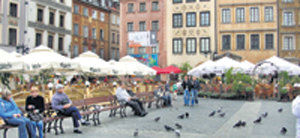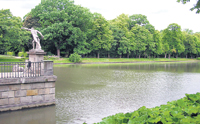|
A communist hangover? Much more a European partner Glimpse into Lech Walesa country
Warsaw – Do you know that 20 million Poles, more than half of Poland’s population of 38 million, live abroad mainly in the US (estimated 10 million)? What a resource for foreign exchange earnings or remittances but the Poles generally don’t send money back to the country as many of them are young people who have their own life and no dependants back home.
Or consider this: The once war-torn country, ruined by communists but rose from the rubble, attracted 64 million tourists last year. Sri Lanka can’t even get a fraction of that number for a country that has equally good attractions. Poland, though just into the 16-17th year of development after Soviet domination crumbled in 1989 during the Solidarity struggle for freedom, is booming with its economy among the best in Europe.
Its also organised and a lesson to countries like Sri Lanka. For example, advertising billboards and hoardings are selectively located in the capital – not everywhere and cluttered like what you find in Colombo. Its streets and parkways are a pleasure to drive or walk through without advertisements staring in your face. The free market economy, comparatively young compared to the most advanced France or Germany, draws close to $5 billion in annual foreign investment. There are some similarities in the economic structure – agriculture employs 28.7% of the work force but contributes only 3.4% to the gross domestic product (GDP), reflecting relatively low productivity, which is the case in Sri Lanka too. Its main industry is machine building iron and steel, coal mining, chemicals, shipbuilding, food processing, glass, beverages and textiles and main exports – machinery and transport equipment intermediate manufactured goods and miscellaneous manufactured goods.
The Poles are practical. When both presidents (Poland and Sri Lanka) decided to reopen embassies in the two countries in 1989, Sri Lanka opened one here while Poland closed the embassy in 1991 as it had to reallocate its resources as political and economic ties expanded in Europe and particularly when the Soviet Union broke up. More embassies were opened in the old Soviet Union. According to Wladyslaw Jerzy Wezyk, Director of Foreign Relations at the Polish Chamber of Commerce, the chamber is focusing on the creation of small and medium scale enterprises in the country.
Privatisation of state enterprises which began in 1990/91 has been slow. All state enterprises are sold through the local stock exchange. Interestingly the stock exchange’s first home after reforms got underway was the building of the former Communist Party but the exchange has now moved to another building. Health and education is still held by the state, chamber officials say, adding that Poland is attracting many investors from Western Europe because of a readymade workforce filled with well qualified engineers and technicians. Andrzej Kaczmarek, Deputy Minister of Economy (designated Undersecretary), says there are 1,000s of companies still under state control. Most of them except strategic ones are to be privatised. “The process of selling the bigger companies involved in energy, coal mining, shipyards, textiles and heavy industry takes longer as they have been neglected and it’s not easy to find buyers,” he said. The budget deficit at 30 billion zloty is very high but national reforms are underway to cut spending.
Robert Seges, Advisor to the Polish Information and Foreign Investment Agency, says the labour force has a large component of young people with 50 percent of the people being below 30 years. Of this 48 percent are in the 20-24 year age group providing a very young and energetic workforce. Poland’s economy is the second best in Central and East Europe. There is large migration of workers particularly to Britain and Ireland but that doesn’t affect the labour market. Many are doctors or work in construction sites, pubs or restaurants. “Most people are young and don’t send money home because there are no dependants back home,” Seges said. From Warsaw, the city of palaces, castles and parks, we took a train to Gdansk, a city better known as the home of the Solidarity movement and its revered leader Lech Walesa. Marcin Szpak, Deputy Mayor of Gdansk was a pleasant surprise. A professional financial consultant and probably just in his late 30’s, Szpak was handpicked by the elected mayor. “Most deputy mayors in Poland are technocrats like me and not politicians. It’s a new phenomenon in Poland where the mayor selects his own team, normally comprising experts,” he said, an example our municipalities and local government could well follow in being efficient. “I was a financial consultant before I came here. The salary is much less but there are many of us who like to do some public service,” Szpak said during a refreshing meeting with three journalists from Sri Lanka and India where his politeness, demeanor and quiet efficiency was very impressive. He spoke of the Vistula river that runs into the Baltic sea which we visited and which plays a big role in creating wealth for the city. Gdansk with 2.2 million people and 1000 lakes is one of the richest cities in Poland but its foreign investment record until recently was not impressive as strong worker unions (based on the Solidarity record) drew reluctance from investors. That is changing however and former Solidarity leader and former President Lech Walesa is making it happen, playing a key role in investment promotion by meeting visiting business delegations and addressing investment seminars. “He makes it a point to tell investors that things have changed and workers are more receptive to change,” Szpak said, adding that Walesa is like a goodwill ambassador for Poland and very “popular when he travels overseas with investment promotion missions.” Walesa lives in Gdansk where he has a house and office. He makes millions of dollars – earning easily about $100,000 per appearance – through speaking engagements across the world like other former world leaders but puts that money back into charity through the Walesa Foundation and Walesa Institute. And here’s the good news about the Gdansk council – last year it had a surplus while this year it is to end up with a deficit for a good cause: a lot of investment is being made on roads, infrastructure, the environment and sports centres. Krystyna Wroblewska, Director at the Gdansk Department for International and Economic Cooperation, says transforming state companies into private sector-driven ones is taking time as workers are unwilling for change. She says rural people still prefer state jobs (a similar case in Sri Lanka) as its safe and provides security even thought its less money – the public sector is less inclined to fire workers. (The writer recently visited Warsaw and Gdansk on a government-sponsored trip). | ||||||||||
Copyright © 2006 Wijeya Newspapers
Ltd. All rights reserved. |




